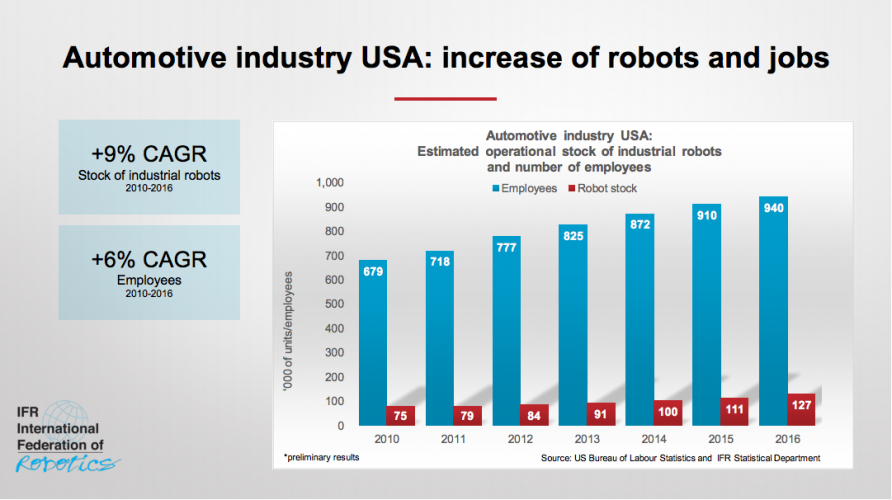Between 2010 and 2016, the operational stock of industrial robots in the automotive sector increased by about 52,000. According to the US Bureau of Labour Statistics, the number of jobs in the sector rose by 260,600 over the same period. Speaking at the World Robotics IFR CEO Roundtable in Chicago, IFR president Joe Gemma claimed that automation was helping the US to reclaim some of the manufacturing jobs lost overseas in recent decades.

“The main driving force of this growth is the ongoing trend to automate production in order to strengthen the competitiveness of American industry globally, to keep manufacturing at home, and in some cases bring back manufacturing that had previously been outsourced to other countries,” he said.
While it’s unclear if the increase in jobs has come as a direct result of automation in the car industry, it is not the only sector to have witnessed a positive correlation between the two. According to Jon Battles, Amazon’s director of worldwide engineering advanced technologies, the impending wave of automation that many fear could actually have a positive effect on overall job numbers.
“The key message is the optimism about jobs in the future – especially with technology,” said Battles. “We are so proud of announcing that we are going to create a hundred thousand new full-time and full benefit jobs in the United States. These jobs are all across the country. I want to make a really critical point: We are doing this level of hiring after installing 45,000 Amazon robotic systems in our fulfilment centres. I don’t have any better success story to give than that and we a hiring in every job class and level.”
“We have about eight million baby boomers exiting the workforce over the next five to ten years. It turns out the baby boomers are the most industrial-trained part of the US workforce. We are heading towards a gap and I hope we all internalise the importance of inspiring this young generation coming up, retraining the people we have, giving them a great vision for careers in the future and following through on that. I am very optimistic about the future and the jobs and the technology.”





Glasgow trial explores AR cues for autonomous road safety
They've ploughed into a few vulnerable road users in the past. Making that less likely will make it spectacularly easy to stop the traffic for...